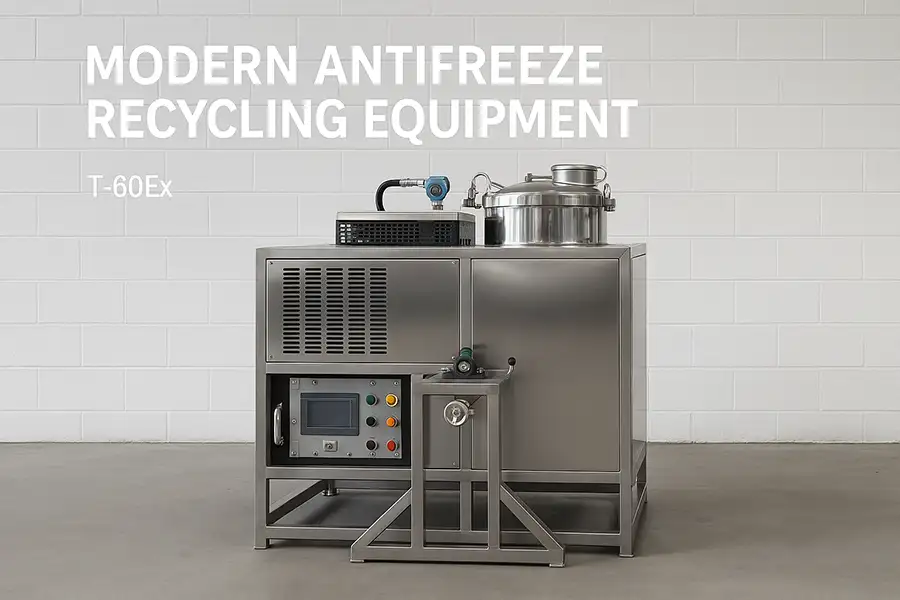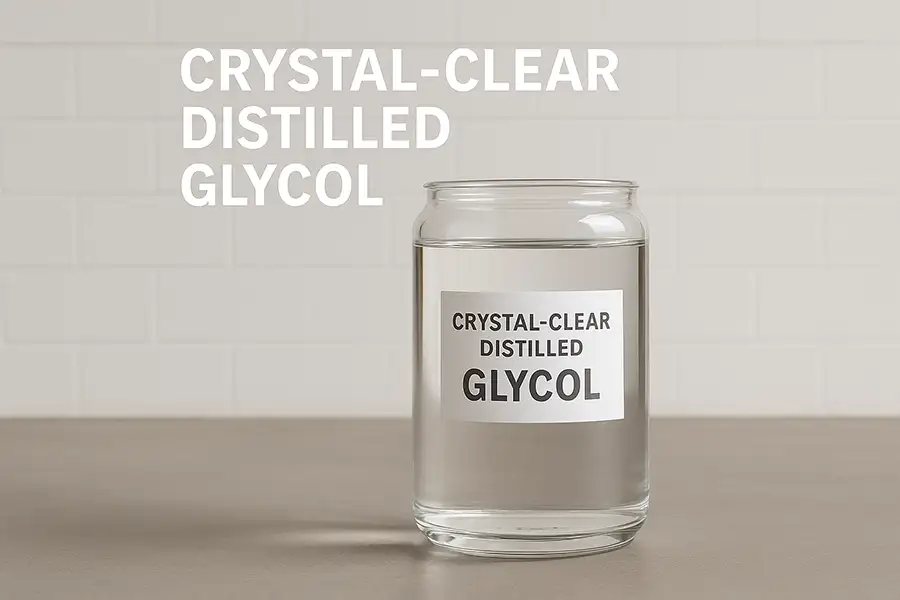Antifreeze Recycling: Transforming Ethylene Glycol Waste into Profit
Cut costs, ensure compliance, and protect the planet with our comprehensive recycling solution
Why Bother Recycling Antifreeze?
Every year roughly 700 million liters of used engine coolant are drained from cars, trucks, data-center chillers and heavy equipment in North America alone. The main active component in that coolant is Ethylene Glycol (EG)—a simple, colorless diol that keeps engines from freezing or boiling over.
EPA estimate: Improper disposal of a single 4-liter jug of spent coolant can contaminate up to 2 million liters of freshwater. That is enough drinking water for 700 people for an entire year.
Recycling captures up to 95 % of the ethylene glycol and allows it to be re-blended with fresh additives. The outcome: lower purchasing costs, dramatically reduced hazardous-waste bills and a smaller carbon footprint.

How Modern Recyclers Transform Waste
In a nutshell, antifreeze recycling is a specialized form of solvent recovery. The feed stream—made of used coolant, rust flakes, dissolved salts and trace oil—is treated in three consecutive steps:
Pre-Filtration & pH Adjustment – removes gravel-sized debris and brings acidity back into a neutral range.
Vacuum Distillation – gently boils ethylene glycol at around 120 °C under reduced pressure. Heavy metals and water stay behind as a concentrate.
Additive Package Re-Blend – a measured dose of corrosion inhibitors, dyes and antifoaming agents turns the base glycol into OEM-grade coolant.
Curious about the science behind distillation? Take a look at our deep dive on how a solvent recovery system works.
Is it safe to mix used antifreeze from gasoline cars and diesel trucks before recycling?
Answer: Yes—provided the recycler’s holding tank is large enough to equalize chemistry and the feed is only ethylene-glycol based. Mixing propylene-glycol coolant or silicate-heavy European formulas can cause gel formation that clogs filters.
Financial & Environmental Impact
Below is a conservative scenario for a 20-bay service center servicing 6,000 vehicles per year.
| Item | Without Recycling | With On-Site Recycler |
|---|---|---|
| New Coolant Purchase | $34,800 / yr | $8,700 / yr |
| Hazardous Waste Hauling | $7,200 / yr | $1,200 / yr |
| Total Annual Cost | $42,000 | $9,900 |
| Environmental Impact | ~70 tons CO2e | ~12 tons CO2e |
How long does it take for the equipment investment to break even?
Answer: A mid-sized solvent recycling machine suited for antifreeze costs roughly $25k. Using the savings above, the payback period is well under eight months.
MIT Technology & Work Report 2024: "Automation in waste-liquid treatment has reduced manual handling by 42% across pilot sites." The same study predicts a 30% rise in demand for skilled recycler technicians by 2030.

Environmental & Legal Considerations
Discharging spent coolant into a storm drain is a violation of the U.S. Clean Water Act and can trigger fines up to $50,000 per incident. In the EU, Directive 2008/98/EC lists ethylene glycol waste under "Absolute Hazardous" if it contains heavy metals above threshold limits.
By recycling in a closed loop, the concentrate is classified as a solid hazardous residue—much cheaper to ship and easier to document in annual sustainability reports.
Do local authorities accept in-house recycled coolant for resale?
Answer: Most jurisdictions allow resale provided you keep batch records and the product meets ASTM D3306 specs. Always verify with your state EPA office.
Choosing The Right Recycler
Key specifications to evaluate include:
Distillation Throughput – 5 – 200 gallons per shift.
Vacuum Level – deeper vacuum means lower boiling point and less energy.
Automatic Sludge Discharge – cuts operator exposure to toxic residues.
Heat-Recovery Coil – scavenges up to 20% energy from the hot condensate.
Remote Diagnostics – enables predictive maintenance and reduces downtime.
Our engineering team has packaged these options in an easy-to-install, modular solvent recycling system that ships ready for standard voltage inputs.
Transform Waste Into Profit - Start Today
Whether you operate a small repair shop or manage a nationwide fleet, antifreeze recycling delivers rapid ROI. Transition to a closed-loop system, enhance your ESG profile, and create new revenue streams while protecting the environment.
Our experts will provide a personalized savings estimate based on your operations.
Request Your Free Sustainability Audit